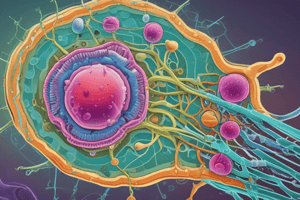Podcast
Questions and Answers
What is one key advantage of using protoplasts for gene transfer in higher plants?
What is one key advantage of using protoplasts for gene transfer in higher plants?
- Protoplasts are resistant to stress during the gene transfer process
- Protoplasts are easier to genetically modify compared to other plant cells
- Protoplasts can be cultured and lead to the regeneration of whole plants (correct)
- Protoplasts have limited diversity in terms of genotypes
Why is it essential to develop a variety of techniques for gene transfer in plants?
Why is it essential to develop a variety of techniques for gene transfer in plants?
- To limit the diversity of genotypes within plant species
- To overcome the difficulty of identifying target cells for gene transformation
- To cater to the enormous diversity of plant species and genotypes available (correct)
- To simplify the process of gene transfer in plants
What distinguishes plant cells from animal cells in terms of regeneration potential?
What distinguishes plant cells from animal cells in terms of regeneration potential?
- Animal cells are totipotent and can regenerate more efficiently than plant cells
- Animal cells do not require in vitro conditions for regeneration
- Plant cells are totipotent and can be stimulated to regenerate into whole plants (correct)
- Plant cells are incapable of regeneration into whole plants
Why is genome stress mentioned as a concern in in vitro plant regeneration?
Why is genome stress mentioned as a concern in in vitro plant regeneration?
Why are transformed cells that cannot undergo regeneration considered of limited value?
Why are transformed cells that cannot undergo regeneration considered of limited value?
What factor makes the identification of target cell types for gene transformation challenging in many plant species?
What factor makes the identification of target cell types for gene transformation challenging in many plant species?
How do immature embryos, pollen, and zygotes contribute to gene transfer in plants?
How do immature embryos, pollen, and zygotes contribute to gene transfer in plants?
Flashcards are hidden until you start studying




